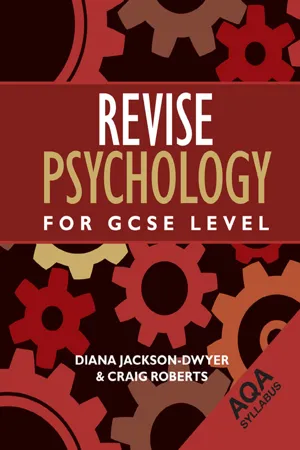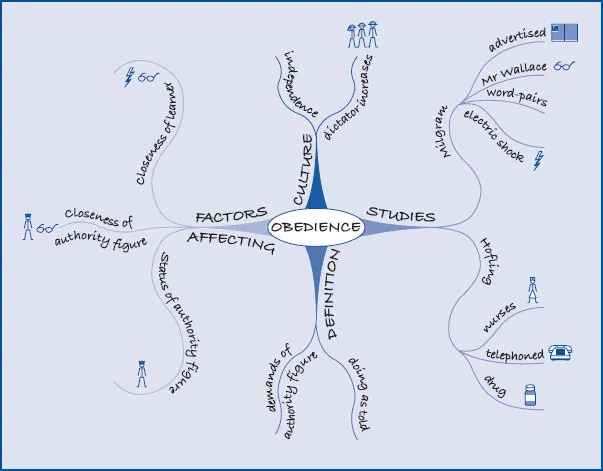
This is a test
- 144 pages
- English
- ePUB (mobile friendly)
- Available on iOS & Android
eBook - ePub
Book details
Book preview
Table of contents
Citations
About This Book
This is a comprehensive student revision guide for those taking the GCSE AQA Psychology exam. It summarises the specification material clearly and attractively, enabling students to easily digest and retain the information.
Packed full of revision tips and techniques, the book includes a number of unique and helpful features:
- Overviews of the AQA specification content
- Summaries of the major research studies
- Practical and innovative suggestions for revision techniques at the end of each chapter
- Example exam questions and model answers
- A separate chapter dedicated to preparing for the exam, giving practical advice on getting organised, techniques for maximising revision time, and advice on structuring exam time appropriately for optimum performance
- A comprehensive glossary of important terms and their definitions, to aid understanding of the material.
Revise Psychology for GCSE Level gives excellent guidance, not only on how to pass the exam, but also on how to avoid the panic and pitfalls that so many students face at exam time. Although a companion to the bestselling Psychology for GCSE Level, 2nd edition by Dwyer and Roberts, this revision guide can be used alongside any GCSE psychology textbook.
Frequently asked questions
At the moment all of our mobile-responsive ePub books are available to download via the app. Most of our PDFs are also available to download and we're working on making the final remaining ones downloadable now. Learn more here.
Both plans give you full access to the library and all of Perlego’s features. The only differences are the price and subscription period: With the annual plan you’ll save around 30% compared to 12 months on the monthly plan.
We are an online textbook subscription service, where you can get access to an entire online library for less than the price of a single book per month. With over 1 million books across 1000+ topics, we’ve got you covered! Learn more here.
Look out for the read-aloud symbol on your next book to see if you can listen to it. The read-aloud tool reads text aloud for you, highlighting the text as it is being read. You can pause it, speed it up and slow it down. Learn more here.
Yes, you can access Revise Psychology for GCSE Level by Diana Jackson-Dwyer,Craig Roberts in PDF and/or ePUB format, as well as other popular books in Psicologia & Storia e teoria della psicologia. We have over one million books available in our catalogue for you to explore.
Information
PREPARING FOR THE GCSE EXAM | 1 |
About your GCSE course
The AQA course consists of two units:
Unit 1: Making sense of other people
The content of this is:
• Memory
• Non-verbal communication
• Development of personality
• Stereotyping, prejudice, discrimination
• Research methods
Unit 2: Understanding other people
The content of this is:
• Learning
• Social influence
• Sex and gender
• Aggression
• Research methods
Structure and content of the AQA examinations
There are two examination papers, one for each unit. Paper 1 and Paper 2 are the same in length and structure: each is worth 50% of the GCSE marks, is 1 hour 30 minutes long and is out of 80 marks in total.
There are five questions and you must answer them all. There are five sections; the first four are the topic areas and the fifth section is Research Methods.
| Paper 1 | Paper 2 | Marks on each section | Suggested time allocation in the exam |
| Memory | Learning | 15 marks | 15 min |
| Non-verbal communication | Social influence | 15 marks | 15 min |
| Development of personality | Sex and gender | 15 marks | 15 min |
| Stereotyping, prejudice, discrimination | Aggression | 15 marks | 15 min |
| Research methods | Research methods | 20 marks | 20 min |
| Total | 80 marks | 80 min (+ 20 min checking time) |
Quality of written communication (QWC)
You will be examined on the quality of your writing. This means that, in order to maximise your
marks in an exam, you should:
• Make sure that your writing is legible (that it can be read) and that spelling, punctuation and grammar are accurate so that the meaning is clear.
• Organise the information clearly. Try to avoid bullet points where possible and write in full sentences with appropriate use of capital letters and full stops. On the longer answers, paragraph your work.
• Use psychological terms wherever possible and appropriate.
• Do NOT use text language!
| Examples of how NOT to write to gain marks for QWC | Examples of how to write to gain marks for QWC | |
| Writing should be legible |  |  |
| Spelling, punctuation and grammar should be correct | Femals have 2X cromasomes and men has XY this is what makes them men and women | Females have XX chromosomes whilst males have XY. These are sex chromosomes, which are responsible for the sex of the individual |
| Use psychological terms | There’s not much room in your immediate memory | Short-term memory has a small capacity, about seven items |
| People don’t like it if u stand 2 close | People become uncomfortable if their personal space is invaded | |
| Milgram should not have lied to people | Milgram has been criticised for deceiving the participants |
On the exam paper, for some of the longer questions you will be asked to write “in continuous prose”. This is an indication that QWC will be assessed in the answer. Be particularly careful to avoid using note form or bullet points in these answers because this will reduce your QWC marks. (In the other answers you probably will not lose marks by using bullet points, but it’s a good habit to try to avoid them so that you are not tempted to use them on the answers in which QWC is assessed.)
Revision
Organise yourself
1. Know exactly what you have to learn for each of your exams.
2. Make sure you have notes on everything. There is no choice of questions in the exam, so be aware that you need to know everything.
3. Make a list of what you need to learn. You can tick things off as you go.
4. Look at past papers.
5. Sort out the times you will revise. Try to allow a reasonable length of time but give yourself frequent short breaks. Do about 30 minutes and then take a 5-minute break. Repeat this for three sessions and then take a good break (at least half an hour).
6. Sort out a quiet, comfortable place to revise. If home is too noisy, try the local library.

How to revise
There are many ways to revise – the key is to find a method that suits you.
Suggested revision activities
Write revision notes
Revision notes are brief notes made from your class notes or a textbook. The key is that you reword them (don’t just copy), as this means you have to understand what you are writing and this is crucial for remembering. When you write your notes, make them well organised (lots of numbered points) and visually memorable – use different colours and illustrations that might help you to remember.
Summarise the main studies
In an exam you may have to summarise a study in a few lines. Always learn core studies in terms of aim, method, findings, conclusion.
Draw pictures
Whenever possible, draw pictures to illustrate what you are trying to remember. For example, draw labelled storage jars for the multistore model of memory, each jar representing one store and surrounded by pictures that illustrate the characteristics of the store.
Do mind maps
This is a different way of writing revision notes. Mind maps are useful for seeing an overview of a topic; they really do help to summarise the whole topic area and to see how concepts fit together.

Make revision cards
Write a question or concept on one side and the answer on the other. With respect to methods, you could do three cards for each method (observation, questionnaire and so on), one asking for the definition, one for an advantage and one for a disadvantage.
Do more than just rea...
Table of contents
- Cover
- Half Title
- Title Page
- Copyright Page
- Table of Contents
- Chapter 1 Preparing for the GCSE Exam
- Chapter 2 Memory
- Chapter 3 Non-Verbal Communication
- Chapter 4 Development of Personality
- Chapter 5 Stereotyping, Prejudice and Discrimination
- Chapter 6 Learning
- Chapter 7 Social Influence
- Chapter 8 Sex and Gender
- Chapter 9 Aggression
- Chapter 10 Research Methods
- Glossary